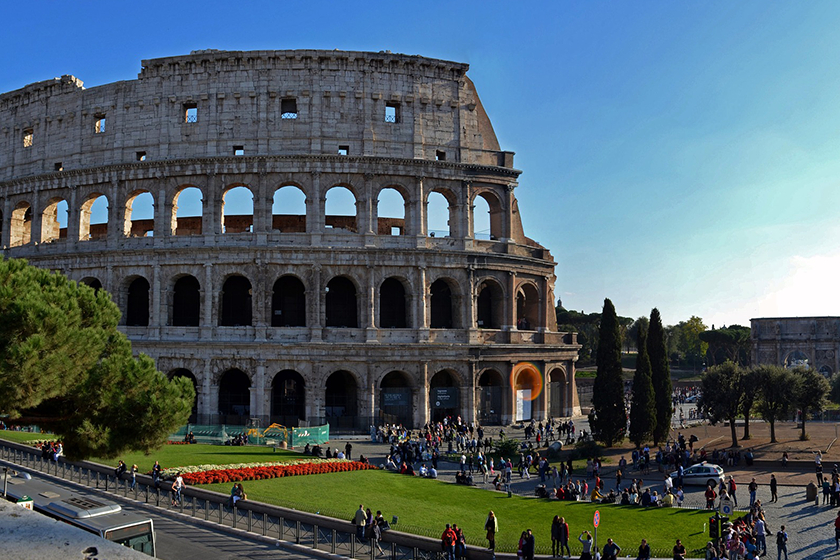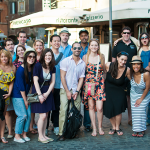For most people, pizza, pasta, and Prada are the only reasons they need to visit the Eternal City. As a law student, however, we must give careful consideration to how we spend our time and money at this critical time in our careers.
Almost a year after enrolling in the Rome Program, I look back on those warm, sunny days and appreciate not only the cultural and culinary aspects of the trip, but also the academic and educational aspects that enriched my law school experience.
Take classes you wouldn’t otherwise take
Between bar courses, practicums, and writing requirements, six semesters is just not enough time to delve into every appealing legal topic. The Rome Program gives you the opportunity to sneak in 3-5 credits worth of classes you might not otherwise take.
For students interested in international law, Rome is an opportunity to complete prioritized classes faster than they would otherwise. I would have graduated without having taken a single international law class had it not been for Rome. This means I would have left Temple Law without getting Professor Abreu’s perspective on the Value Added Tax, or Professor Shellenberger’s explanation of the Passive Personality Principle.
While international law might not be the focus of my career, these additional classes have contributed to a well-rounded law school experience and have helped me to be a more informed legal thinker. Time spent studying is not wasted, and that is certainly true of the classes you take in Rome, whatever your interest is.
Get credit for thinking about the law in a more personal way
Alongside the traditional courses, Rome offers Global Legal Perspectives, which is a less traditional course in that it gives you a place to think and talk about the way laws effect daily life. Guest speakers, usually practicing attorneys in Europe, spoke generally about the legal profession in the EU. We also took time to tour a couple of Italian law firms to better understand what it is to be a lawyer in a Civil Law system. This was a great way to think about and compare the Civil Law system to the advantages and disadvantages of the Common Law system.
You also get an opportunity to write reflection papers on your observations. While in Rome, I noticed that, compared to the U.S., there were more warnings on tobacco products, but fewer warnings on alcohol products. Health Law is something that I am interested in, so I explored some basic EU health policies and learned a bit about the difference between EU and US health policies while writing a reflection paper on my observations. Being in a drastically different legal system gives you a unique prospective and space to reflect, not only on the system you are visiting, but the system you live in.
Get out of your comfort zone
During orientation, law students are told again and again that lawyers have to embrace the unknown; get comfortable being uncomfortable. Rome is a daily exercise in this skill. From the minute you walk out your door, you are in an alien environment that cannot be replicated elsewhere. Every aspect of the day is new and confusing.
For example, I never quite got the hang of ordering my morning coffee. There are two different ways to order coffee in cafés: sometimes you pay first, sometimes you order first, and you can’t really tell which practice each café follows. So I would guess, and sometimes that would lead to a lot of awkward standing and gesturing on my part. Sometimes I would order my “caffé” and it would come back as an Americano when I thought I ordered an espresso. Eventually, I stopped worrying so much and focused instead on finding the excitement in the uncertainty and owning my awkwardness.
From not knowing how to cross the street to not knowing how to order a coffee, every action and interaction in Italy is ripe with unknowns, which require you to think on your feet. By the end of the program, I wasn’t able to anticipate all of the unknowns, but I did learn the skills to react to those challenges with confidence, and that will set me up to succeed as I experience the unknowns in my legal career.
Have your cake and eat it too
Many of the points above also apply to the semester-long study abroad programs that Temple offers. Rome, however, is less of a time commitment. Since the Rome program is only six weeks long, you can experience living abroad without having to miss out on a full semester in Philly or even a summer internship, and you don’t have to worry about sub-letting your apartment for four months.
“During orientation, law students are told again and again that lawyers have to embrace the unknown; get comfortable being uncomfortable. Rome is a daily exercise in this skill.”
Missing out on a summer job was one of my main reservations about going to Rome. However, I found a job that allowed me to start after I got back. And for those looking to get international experience, a few students were even able to intern at Italian firms during the Program, which is a valuable experience you can’t get in Philly, If wanderlust is prompting you towards adventure, but four months without a cheesesteak is too much to bear, then Rome might just be the perfect solution.
Living in Rome for five weeks is a great experience for anyone, but experiencing Rome while a law student is an opportunity for unique growth. The Temple faculty and staff work to tailor the program to the interests of the law student, which results in an experience that is wholly beneficial to us as students and future lawyers. Not only do you learn about the law, but you also learn a lot about yourself and your own limits and abilities. Time in law school is precious, but I couldn’t be happier with how I spent those five weeks.




1 Comment